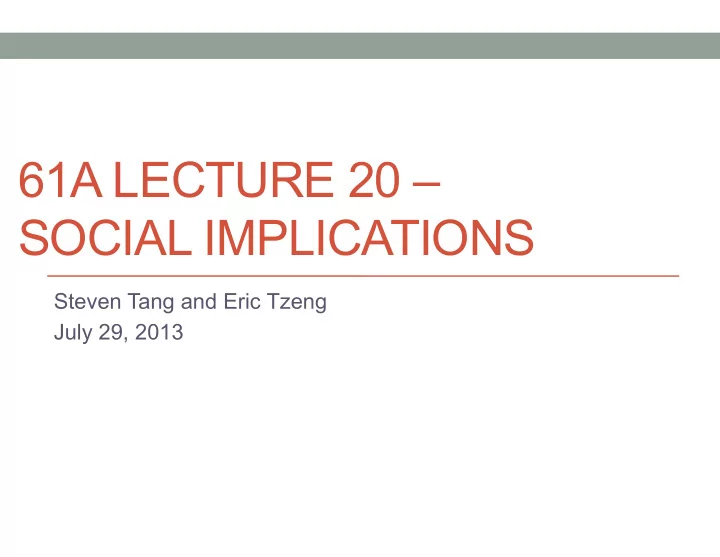

61A LECTURE 20 – SOCIAL IMPLICATIONS Steven Tang and Eric Tzeng July 29, 2013
Announcements • Midterm this Thursday • Information posted later today • 3 exam rooms: • aa-gz 2050 VLSB • ha-jz 2060 VLSB • ka-zz 2040 VLSB • Project 4 out today • Writing a Scheme interpreter in Python • “Recursive Art” Contest!
Turtle graphics • STk has built in support for basic 2D graphics! Picture by Jonathan Zander • Turtle sits on the canvas • As the turtle “walks” around the canvas, it leaves a trail • Images are drawn by issuing commands to the turtle (define ¡(triangle) ¡ ¡ ¡(forward ¡100) ¡ Move forward ¡ ¡(right ¡120) ¡ 100 steps Turn right 120 ¡ ¡(forward ¡100) ¡ degrees ¡ ¡(right ¡120) ¡ ¡ ¡(forward ¡100) ¡ ¡ ¡(right ¡120)) ¡
“Recursive Art” Contest! • Create a visualization of an iterative or recursive process of your choosing, using turtle graphics. Your implementation must be written entirely in Scheme using the interpreter you have built. • Prizes will be awarded for the winning entry in each of the following categories, as well as 3 extra credit points. • Featherweight. At most 256 tokens of Scheme, not including comments and delimiters. • Heavyweight. At most 2013 tokens of Scheme, not including comments and delimiters. • Winners will be selected by popular vote as part of a future homework • More details online later today!
Past winners • Look at the side screens!
Midterm Survey Results • Most people are happy with the way things are! • Great! • Some suggestions: • 8am is a terrible time for lecture • I agree! Sorry about that. • Lectures should contain more jokes • Pace of course is too fast • In the regular semester, this is a common complaint. • No doubt it’s exacerbated during the condensed summer schedule, but we do need to cover the same amount of material • Use a grading curve instead of the absolute scale • The absolute scale can only help your grade. If grades are too low at the end of the semester, we may add points to everyone’s grades to bring up the average.
Read-Eval-Print Loop The ¡user ¡interface ¡to ¡many ¡programming ¡languages ¡is ¡an ¡interac4ve ¡ loop, ¡which ¡ • Reads ¡an ¡expression ¡from ¡the ¡user, ¡ • Parses ¡the ¡input ¡to ¡build ¡an ¡expression ¡tree, ¡ • Evaluates ¡the ¡expression ¡tree, ¡ • Prints ¡the ¡resul4ng ¡value ¡of ¡the ¡expression ¡ The ¡REPL ¡handles ¡errors ¡by ¡prin4ng ¡informa4ve ¡messages ¡for ¡the ¡user, ¡ rather ¡than ¡crashing ¡ A ¡well-‑designed ¡REPL ¡should ¡not ¡crash ¡on ¡any ¡input! ¡
Raising Application Errors The ¡ - ¡and ¡ / ¡operators ¡have ¡restric4ons ¡on ¡argument ¡number ¡ Raising ¡excep4ons ¡in ¡ apply ¡can ¡iden4fy ¡such ¡issues ¡ def calc_apply(op, args): """Apply an operator to a list of args.""" if op == '-': if len(args) == 0: raise TypeError(‘Not enough arguments’) ... if op == '/': if len(args) == 2: raise TypeError(‘Not enough arguments’) ...
Social Implications • After the CS61 series, you will become a very capable programmer • It’s very possible that the code you write in the next few years could affect millions of people • Life/death situations, catastrophic accidents, privacy invasions, intellectual property disputes... Read Ch1. of Blown to Bits • Be aware of how the code you write can influence the world
Social Implications • CS161 - Computer Security. UC Berkeley has several world- renowned security Professors. • CS195 - Social Implications of Computer Technology. New requirement for CS/EECS majors.
Recommend
More recommend